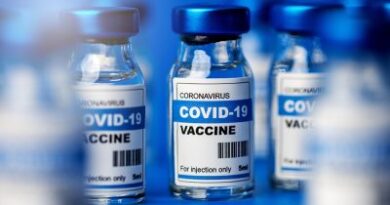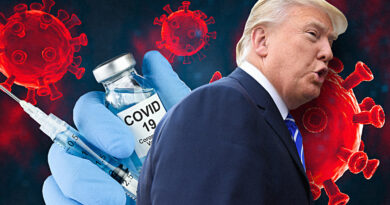Health care after COVID-19: vaccine passports, social disruption and a forgetting of this era
Children will board school buses. Lines will form without 6-foot gaps.
Fans will fill stands, shoppers will fill stores, the plastic barriers will come down, the hugs will come back, faces will become visible and people will travel through crowds without worry.
Or will they?
Experts say that pandemics change us, after all, and not always in ways that make sense, especially when it comes to the way we view health and our surroundings. After all, if our response to pandemics were rational, we would immediately set about stopping the next one at its source — in the wild.
We would, for example, fully fund the so-called “One Health” initiatives dedicated to building tripwires for the global interconnection of humans, wildlife and domesticated animals with whom we share viruses.
That’s how we got COVID-19, after all: From a virus jumping species in the aftermath of climate change and destruction of habitat.
Instead, as reported in the current issue of The Nation, the Trump administration in 2019 canceled USAID funding for Predict, a global program for tracking viruses in bat colonies and breaking down bureaucracies that artificially separate the overseers of wilderness from global health programs.
So yes, COVID-19 will change us in ways that do not always make sense. Let’s start with some changes that did make sense. For instance, health care became more cooperative during COVID-19, says Dr. John Halamka, president of Mayo Clinic Platform.

Mayo Platform President Dr. John Halamka believes “we’ll need to create novel technologies which enable consumers to offer proof of vaccine when that is needed to rejoin the workplace or public events.”
“The pandemic has been a tragedy, but it has accelerated innovation 10 years in 10 months,” Halamka says. “The greatest lesson we learned was that working together enables us to solve the biggest problems.”
Just as Apple, Google, and other digital firms came together to create a privacy-protecting contact tracing, he says, cooperation soared between private hospital systems and academic health centers.
“We had to coordinate decision-making in every county to open and close schools, restaurants and bars based on data,” Halamka says. “Twelve-hundred companies came together to create the COVID-19 Healthcare Alliance … Competitors worked together for the benefit of all.”
That’s all happened already. Looking into his crystal ball, the Mayo artificial intelligence futurist predicts the need for novel technologies to signal proof-of-vaccine, an expansion of virtual care and telehealth into treating complex health problems at home, and a renewed focus on disparities in care.
“We will focus on equity,” he says. “So that each person gets the care they need, when they need it.”
Learning difficult lessons

NYU Medical ethicist Arthur Caplan says we can expect certain private businesses to require vaccine passports after COVID-19 is passed. Submitted photo.
Arthur Caplan, a bioethicist at the NYU School of Medicine, is also sanguine about COVID-19. He believes we have learned difficult lessons.
“I think we’ll come out of it better,” he says. “Even though we’ll come out of it with too many people whose deaths could have been prevented.”
In tallying the winners and losers of the lost year that was 2020, Caplan singles out the global drug industry for its fast production of safe and effective vaccines. It was the cavalry, and that will be remembered.
“I think the pharmaceutical industry will find its reputation buffed up,” he says. “They were down at the bottom of who Americans trusted or liked. I think their reputation will be improved, and that as a result it will be harder to go after them on issues like the high cost of drugs.”
MORE FROM THE 2020 PROJECT:
On the losing side of this ledger sheet, however, Caplan believes the aftermath of COVID-19 will not be kind to the outgoing president.
“I think we’ll be pointing fingers at the Trump administration for hundreds of thousands of deaths, some of which could have been prevented, and that they just blew it. That will make Trump go down as an unelectable person in 2024.”
Another loser, in Caplan’s view, is our insistence on seeing medicine as something exclusively conducted with pharmaceutical and biological treatments, a focus neglecting vital social and behavioral aspects of health care — like how to get people to wear masks.
“I think one of things we have to do is to get better at persuading people to do things to help their neighbors,” he says. “We don’t really spend much on that research. We spend a lot on biology and genetics, but not nearly enough on trying to change risk behaviors.”
LIke Mayo’s Halamka, Caplan sees proof of inoculation passports as inevitable.
“I think you’ll see people carrying vaccine passports around to prove they have been vaccinated against COVID,” he says. “Those will likely be required to get on a train, boat, cruise ship, airline or to travel internationally.”
“A lot of people worry the government’s going to make them have these cards, but I think it’s the private sector that actually takes the lead. We’re a little more comfortable when somebody says, ‘if you want to come in the gym, you have to show me a passport,’ because you don’t have to go in the gym.”
“If you don’t like the vaccine passport,” he says, “you’re going to have to take it up with the airline, and the airline can impose those conditions as it wishes. It’s not something you’re going to win a lawsuit about.”
RELATED: For travel and tourism industry, pandemic brought both short-term and lasting changes
Our entrepreneurial spirit will almost certainly trigger a robust market in counterfeit passports, Caplan adds, but that being said, the celebrated American streak of individualism, “really damaged us severely,” in the final lesson.
“By not pulling together, by not having a common message, by having different parts of the country following different messaging from their governors, whether it was mask-don’t mask, distance-don’t distance, go to school-don’t go to school, eat in a restaurant-don’t eat in a restaurant, we wound up spreading the virus. So there’s no doubt that it hurt us.”
And don’t get him started on the free and open marketplace of ideas that is the internet.
“There’s been more interest in science,” Caplan says. “But at the same time, the internet has turned out to be a cesspool of misinformation — bigotry, bias, crazy views. I don’t know what you do about that … That’s going to be a constant problem for a while.”
A relaxed state

Historian Phillipp Blom believes that societies are vulnerable to witch hunts and conspiracy theories after a pandemic. Submitted photo.
For Philipp Blom, historian and author of “Fracture: Life and Culture in the West, 1918-1938,” our parallels with the period following the Great Influenza are few. It was an era overwhelmingly affected by war and physical collapse, in his reading. Except for the troubling rise, post-pandemic, of bigotry.
“If we learn anything from other pandemics,” Blom says, “it is that there is likely to be some degree of social and economic change afterward, as old structures are shaken up or weakened.”
He believes we in the comfortable, overweight, COVID-19-afflicted Western nations will be affected by COVID-19, more than anything else, for its harsh introduction to state control.
“For many people, this is the moment when the state returns into their lives. They have lived lives without curfews and police controls, without being forced to wear masks, to stay at home, to cancel travel — without the massive and restrictive influence the (government) now exercises over their lives.”
The 1920s saw the rise of anti-immigration sentiment and the birth of the Ku Klux Klan. As historians like John M. Barry, author of “The Great Influenza,” have argued, because the government of the day tried to repress or downplay the truth of that outbreak — something experienced by Americans early in the 2020 outbreak — the very idea of truth itself became less knowable, leading to unintended consequences.
“Witch hunts and conspiracy theories are also classic accompanying signs (of pandemics) through the ages,” Blom says, “and these conspiracies often use old narratives like anti-semitic tropes.”
“During the Middle Ages, Jews were supposed to have poisoned the wells to make Christians sick,” Blom says. He sees similar phenomena at work today in the rise of “conspiracy nuts from QAnon to others blaming George Soros or Bill Gates.”
Tendency to forget

Laura Spinney, author of Pale Riders: The Spanish Flu of 1918 and How it Changed the World, says we tend to forget the lessons of pandemics once we pass through them. Submitted photo.
“Pandemics tend to exacerbate trends that were already in place,” adds Laura Spinney, author of “Pale Rider: The Spanish Flu of 1918 and How it Changed the World.” “If there was a stream of xenophobia underlying society, then maybe … you would find it easier to blame foreigners for this disease, even though that’s not the real cause.”
Spinney says few lessons were learned from the Spanish Flu, and she holds similar expectations for COVID-19.
“If you look back over history, our tendency as human beings has been to forget pandemics as soon as they’re passed. We cycle between complacency and panic. We panic when the pandemic erupts, then we forget about it, go back to complacency, and we don’t take the necessary steps to ensure we will be better prepared next time.”
“When you’re inside one as we are now, there’s a lot of talk about how things will never be the same, blah blah blah, but we do have this tendency to forget. So there’s this link between forgetting and being unprepared.”
Spinney’s book points to an odd series of counter-movements that emerged after the 1918 flu, including alternative medicine, “our love of fresh air and our passion for sport,” as well as the systems of universal health care that were adopted throughout Europe.
Epidemiology became a science during this same period. But in general, the wonders of science and medicine took a beating.
“It definitely reshaped the way medicine was delivered from the 1920s on,” she says. “After the war and pandemic, a lot of things people had held sacred … like science and technology, they started to question them,” she says. “Because where had science and technology led us? To industrial scale war, and it hadn’t been able to stem this dreadful pandemic.”
In her book, she calls this realization “humiliating.”
“We’re not terribly good at humility are we?” she says. “But I think pandemics are one of the few things that does instill humility now and then … Hopefully we’ll remember we’re not invincible just long enough to make ourselves a little more robust in the future.”
“Maybe this will be different,” she adds, “because it is the first postmodern pandemic that was witnessed in great detail. So we’ll have to wait and see. But although we forget them, they do change us, and not necessarily in the way we think they will. I think that is the lesson for history.”
This story is part of a 13-day series that looks at all the ways 2020 has changed us. From now until 2021, expect stories on workplace and education, sports, economics, politics and everything in between.
*** This article has been archived for your research. The original version from Duluth News Tribune can be found here ***



